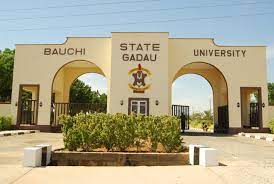Bauchi State University, Gadau (BASUG), nestled in the heart of Gadau, Bauchi State, Nigeria, stands as a beacon of knowledge and a testament to the commitment of the state to higher education.
Established in 2011, this institution of higher learning has been making significant strides in the world of education, offering a diverse range of undergraduate and postgraduate programs across various fields.
In this SEO-optimized article, we will delve into the many facets of BASUG, from its history to admission requirements and notable alumni.

A Brief History of Bauchi State University, Gadau
BASUG owes its name to the late Saadu Zungur, a former governor of Bauchi State, whose vision and dedication to education paved the way for the university’s establishment.
Since its inception, BASUG has grown and expanded, now boasting three distinct campuses: the main campus in Gadau, a campus in Misau, and a campus in Bauchi.
These campuses collectively form a vibrant academic ecosystem, nurturing the minds of countless students.
Academic Programs at BASUG
Bauchi State University, Gadau, prides itself on offering a wide array of academic programs to cater to the diverse interests and career aspirations of its students.
These programs encompass fields such as agriculture, arts, education, engineering, law, pharmacy, science, and social sciences.
Whether you are inclined towards the sciences, arts, or any other discipline, BASUG has something to offer.
Undergraduate Programs
For those aspiring to pursue undergraduate studies at BASUG, there are certain admission requirements to meet.
Applicants must have a minimum of five credits in SSCE or equivalent examinations, meeting the academic standards set by the university.
These standards ensure that students admitted to BASUG are well-prepared to excel in their chosen fields.
Postgraduate Programs
BASUG also opens its doors to those seeking postgraduate education.
To be eligible for postgraduate programs, applicants must hold a bachelor’s degree from a recognized university.
This requirement ensures that students entering the realm of postgraduate studies are equipped with a strong academic foundation.
Admission Requirements and Cut-off Marks
The admission process at BASUG is rigorous, but it ensures that the university maintains high academic standards.
While the cut-off mark for most courses stands at 140, it’s essential to note that this may vary depending on the program’s competitiveness and the availability of spaces.
BASUG’s commitment to academic excellence is evident in its selective admission process.
Direct Entry Requirements
For those seeking direct entry into BASUG, specific criteria must be met:
- Possession of an OND, HND, NCE, A-Level, or a recognized diploma certificate from a reputable institution.
- The diploma must be in a related field to the course you are applying for.
- A minimum of two passes in the relevant subjects at the O’level or equivalent examinations.
These requirements ensure that students entering through the direct entry route possess the necessary foundation to excel in their chosen academic paths.
Applying to BASUG
In this digital age, applying to BASUG has been made more accessible through the online application process.
Prospective students can find detailed information and guidance on the university’s website: Bauchi State University, Gadau – Official Website.
The website provides comprehensive information about programs, admission procedures, and deadlines, making it a valuable resource for applicants.
Notable Alumni
BASUG has been instrumental in shaping the future of Nigeria through its alumni, who have gone on to hold prominent positions in various sectors.
Some of the notable alumni include:
- Adamu Adamu: Serving as the Minister of Education in Nigeria, Adamu Adamu’s contributions to the nation’s educational landscape are noteworthy.
- Mohammed Goje: As a former Governor of Gombe State, Mohammed Goje’s leadership has left a lasting impact on his state and beyond.
- Ahmed Yerima: A former Governor of Zamfara State, Ahmed Yerima’s political career reflects his commitment to public service.
- Lawan Yahaya Gumau: Lawan Yahaya Gumau, the Senator representing Bauchi North Senatorial District, is a distinguished figure in Nigerian politics.
- Sadiya Umar Farouq: Sadiya Umar Farouq, the Minister of Humanitarian Affairs, Disaster Management, and Social Development, continues to make significant contributions to the welfare of Nigerians.
Bauchi State University, Gadau, stands as a testament to the commitment of Bauchi State to providing quality higher education.
With its diverse academic programs, stringent admission standards, and impressive alumni, BASUG is poised to continue making significant contributions to the educational landscape of Nigeria.
As BASUG remains dedicated to its pursuit of academic excellence, it undoubtedly holds a bright future for both its students and the nation as a whole.
As the academic year approaches, it’s essential for students and parents alike to have a clear understanding of the costs associated with pursuing higher education.
One of the critical factors in this journey is knowing the school fees.
In this comprehensive guide, we will delve into the details of the school fees for Bauchi State University, Gadau (BASUG). We’ll break down the expenses for different courses and fee categories, giving you a crystal-clear picture of what to expect.
Bauchi State University, Gadau (BASUG), is a reputable institution known for its commitment to providing quality education to students.
Located in Bauchi State, Nigeria, BASUG offers a wide range of programs in both Arts and Sciences, attracting students from various backgrounds.
Understanding Tuition Fees
Tuition fees form the backbone of any educational institution’s revenue, and BASUG is no exception.
The tuition fees are as follows:
- Arts: N16,000 per session
- Science: N32,000 per session
For Arts students, the annual tuition fee sums up to N16,000, while Science students pay N32,000 per session.
It’s crucial to note that these fees are subject to change, so it’s advisable to check the official BASUG website or contact the institution for the most up-to-date information.
Registration Fees
In addition to tuition fees, students are required to pay registration fees, which help cover administrative costs.
The registration fees at BASUG for the 2023/2024 academic session are as follows:
- Indigenes: N3,000 per session
- Non-Indigenes: N6,000 per session
Indigenous students pay N3,000 per session, while non-indigenous students pay N6,000 per session for registration.
These fees are essential to ensure that the university can efficiently manage the enrollment process for all students.
Exploring Other Mandatory Fees
Apart from tuition and registration fees, BASUG also charges other mandatory fees, each serving a specific purpose.
Let’s take a closer look at these fees:
Library Fees
- N2,000 per session
The library is the heart of any academic institution, providing students with access to a wealth of knowledge.
The N2,000 library fee enables BASUG to maintain its library facilities and provide students with an extensive collection of books and resources.
Medical Fees
- N3,000 per session
Student health is a top priority at BASUG, and the N3,000 medical fee contributes to the provision of basic healthcare services on campus.
This fee ensures that students have access to medical assistance when needed.
Examination Fees
- N5,000 per session
Examinations are an integral part of the academic journey.
The N5,000 examination fee covers the costs associated with conducting exams, including printing question papers, hiring invigilators, and grading.
Sport Fees
- N2,000 per session
Sports play a crucial role in the holistic development of students.
The N2,000 sport fee supports the university’s sports facilities and programs, allowing students to engage in physical activities and competitions.
Utilities Fees
- N10,000 per session
Utilities fees are essential for maintaining a conducive learning environment.
This fee covers electricity, water supply, and other essential services that keep the campus running smoothly.
Orientation Fees
- N1,000 per session
Orientation programs are designed to help new students acclimate to university life.
The N1,000 orientation fee supports the planning and execution of these programs, ensuring that students have a smooth transition into their academic journey.
Caution Deposit
- N1,000 per session
The caution deposit is a security measure that ensures students handle university property responsibly.
This fee is refundable upon graduation or withdrawal from the university.
Identification Card Fees
- N1,000 per session
The identification card is a crucial document for students, providing access to various university services.
The N1,000 identification card fee covers the production and maintenance of these cards.
Student Handbook Fees
- N1,000 per session
The student handbook is a valuable resource that contains essential information about university policies, procedures, and guidelines.
The N1,000 student handbook fee ensures that students receive this important reference material.
Calculating Total School Fees
To determine the total school fees for a year, you need to sum up the fees for each item listed above.
Let’s illustrate this with an example:
Imagine a 100-level indigene student studying Arts at BASUG.
Here’s how you can calculate their total school fees for the academic year:
- Tuition Fee (Arts): N16,000
- Registration Fee (Indigenes): N3,000
- Library Fee: N2,000
- Medical Fee: N3,000
- Examination Fee: N5,000
- Sport Fee: N2,000
- Utilities Fee: N10,000
- Orientation Fee: N1,000
- Caution Deposit: N1,000
- Identification Card Fee: N1,000
- Student Handbook Fee: N1,000
Now, add up all these fees:
N16,000 + N3,000 + N2,000 + N3,000 + N5,000 + N2,000 + N10,000 + N1,000 + N1,000 + N1,000 = N45,000
So, for a 100-level indigene student studying Arts at BASUG, the total school fees for the academic year will be N45,000.
here’s the information presented in tabular form:
| Category | Fee per Session (Naira) |
|---|---|
| Tuition Fees | |
| – Arts | 16,000 |
| – Science | 32,000 |
| Registration Fees | |
| – Indigenes | 3,000 |
| – Non-Indigenes | 6,000 |
| Other Mandatory Fees | |
| – Library | 2,000 |
| – Medical | 3,000 |
| – Examination | 5,000 |
| – Sport | 2,000 |
| – Utilities | 10,000 |
| – Orientation | 1,000 |
| – Caution Deposit | 1,000 |
| – Identification Card | 1,000 |
| – Student Handbook | 1,000 |
To calculate the total school fees for a 100-level indigene student studying Arts at BASUG for the academic year, you would add up the relevant fees:
Total Fees = Tuition Fee (Arts) + Registration Fee (Indigenes) + Library Fee + Medical Fee + Examination Fee + Sport Fee + Utilities Fee + Orientation Fee + Caution Deposit + Identification Card Fee + Student Handbook Fee
Total Fees = 16,000 + 3,000 + 2,000 + 3,000 + 5,000 + 2,000 + 10,000 + 1,000 + 1,000 + 1,000 = 45,000 Naira
So, for a 100-level indigene student studying Arts at BASUG, the total school fees for the academic year will be 45,000 Naira.
Conclusion
Understanding the breakdown of school fees is crucial for students and parents planning for the 2023/2024 academic session at Bauchi State University, Gadau (BASUG).
By providing a detailed overview of the tuition, registration, and other mandatory fees, we hope to assist you in making informed financial decisions for your education.
Remember that these fees are subject to change, so it’s advisable to stay updated through official channels to ensure a smooth academic journey at BASUG.
SEE ALSO OTHER TOPICS:
5 Best Engineering Schools in California with Scholarship for African Students 2024
UNIPORT Departmental Cut Off Mark For All Courses 2024
The Role of Technology in Modern Education

Hello, I’m Prince, a versatile creator in the world of the web. As an article writer, I weave words into compelling stories and informative pieces that engage and inform. Simultaneously, I’m a web developer, crafting digital experiences that come to life on the internet. With a passion for both writing and coding, I thrive on combining creativity and technology to bring ideas to fruition. Join me as we explore the limitless possibilities of the digital realm.





